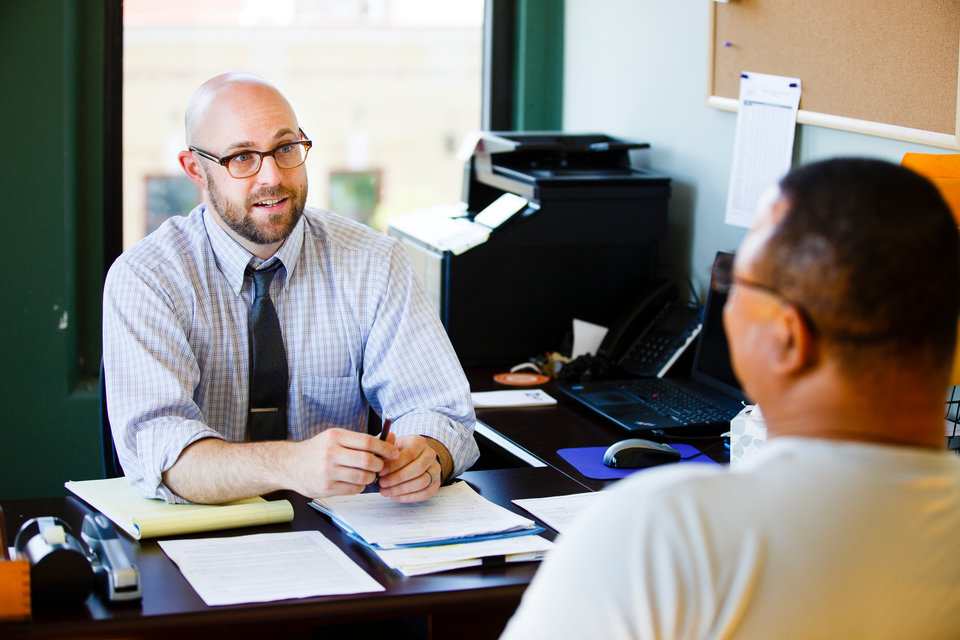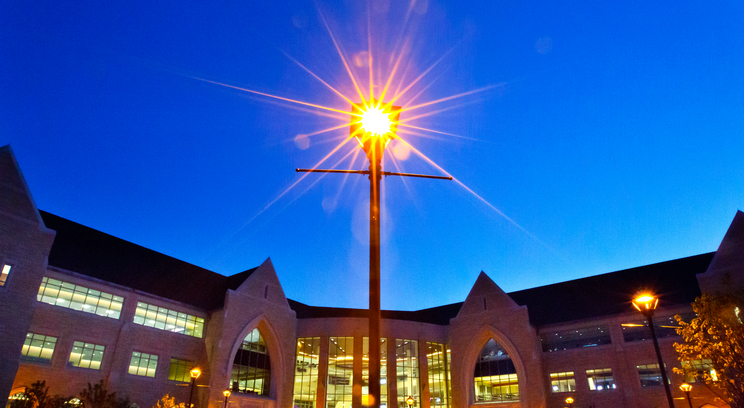Nearly 2,900 veterans receive legal assistance each year through the Minnesota Assistance Council for Veterans (MACV), and just two attorneys handle the majority of incoming cases. This summer, Peter Dotson helped lighten their caseload.
Dotson is one of four St. Thomas Law students who benefited this year from the school’s Public Interest Law Fellowships, which are offered in partnership with the Minnesota Justice Foundation.
“Because of the volume of veterans seeking our help,” Dotson said, “I was trusted to handle much of the required research and writing on my own, with my supervising attorneys providing only occasional guidance and advice.”
The other fellowship recipients include Patricia Alonso Galera, who clerked for an Israeli Supreme Court justice; Christina Espey-Sundt, who interned with the U.N. High Commissioner for Refugees; and Benjamin Hargrove, who worked with the International Justice Mission in Thailand.
The fellowships allow students to spend the summer serving in a way that would not otherwise be possible without taking on additional debt. Instead of pursuing paid work over the summer, these students have chosen to bring what they are learning in the classroom to practice in areas where the payment they receive is, at most, a stipend and more often simply the knowledge that they are advancing the common good. The fellowships often draw students who are preparing to use their education for a life-time of service; for them, their summer work is just one step in the direction they will head after graduation.
This wasn’t Dotson’s first time working with MACV. In 2015 he undertook a pre-orientation service project with the organization.
“I wanted to get my brain in legal mode and help people,” he said, “so I jumped at the opportunity. I spent three days in northern Minnesota providing services through StandDown clinics.” A StandDown is a large event that enables veterans to obtain services they need, such as health screenings, job counseling and legal assistance, and gives them access to food and clothing. During his three days with MACV last year, Dotson, a 2L, provided intake assistance at StandDown legal aid clinics.
His fellowship this summer allowed him to do more in-depth, hands-on work with vets in need of legal service, from filing and research to writing briefs and memos. “MACV provides a panoply of services. Some vets are homeless, while many others are middle class. They need help navigating systems that are new to them across a spectrum of types of law,” Dotson said.
Motivated by a lifelong concern for justice, Dotson’s passion is public policy. “I’d rather help craft than argue law,” he explained. “My dream job would be to work as a lobbyist advocating for important issues, such as those related to vets.”
Learning International Law in Israel
As a relatively new country, Israel often looks at legal precedents in other countries, so the Israeli Supreme Court regularly recruits foreign clerks. Patricia Alonso Galera spent the summer clerking for one of the court’s justices. When she applied for the opportunity, she didn’t believe she had much of a chance.

Patricia Alonso Galera spent the summer clerking for an Israeli Supreme Court justice.
“I was applying for more realistic jobs for the summer, but I really wanted that position,” she said.
Galera speculated that she was offered a foreign clerkship because of her background: She already has a Spanish law degree and is now in her final year of pursuing her J.D. at St. Thomas. She is fluent in French, Spanish, Catalan and English, and she has some knowledge of Italian and Hebrew. “I’m proud to represent St. Thomas alongside clerks from schools like Yale,” she said.
Before applying for the clerkship, Galera was interested in legal aspects of international transactions. In light of her summer work, her horizons have broadened. “I feel like I may be able to do more in international law,” she said. “I hope to have a better understanding of comparative law as a result of my work and that I will have made useful connections.” Part of Galera’s good fortune is that she was assigned to the only judge on the court who comes from private practice. Her summer work in Israel took her into a variety of areas, including public international law, criminal law, corporate law and torts.
Advocating for Immigrant Rights
Christina Espey-Sundt traveled to Washington, D.C., this summer to work with the U.N. High Commissioner for Refugees (UNHCR). This internship is another step along a path to which she feels called: working with refugees.
Now a 3L, she first volunteered in this area while she was an undergraduate student. She served as an office assistant at the Norwegian Organization for Asylum Seekers in Oslo and later volunteered to work with and for refugees through Lutheran Social Service of Minnesota and The Advocates for Human Rights. Over time, she learned what attorneys can do for immigrants and decided to pursue a J.D.

Christina Espey-Sundt, second from right, worked with other interns for the U.N. High Commissioner for Refugees in Washington, D.C.
“I have two possible paths after graduation, and I hope to gain some clarity as I am exposed to the policy dimension of refugee law,” she said. “I may decide to pursue a career in international law, working with an organization like the United Nations, or I may stay in Minnesota and work for a nonprofit, providing direct representation for clients. Whatever I do, I know it will be in the area of immigration.”
Soon after her internship began, Espey-Sundt shared her delight in the opportunity to work for UNHCR. “It is an inspiring place to be and I have already learned so much about UNHCR’s unique role in the immigration field,” she said in June. “My supervisors and peers are incredible, and I am thankful for the chance to learn from them. My tasks are quite varied, and the entire office will soon be gearing up for World Refugee Day. I’m so grateful to be able to participate in this work!”
Interning with the International Justice Mission in Thailand
Benjamin Hargrove’s work brought him to Chiang Mai, Thailand, to work with International Justice Mission (IJM), a Christian human rights organization. Hargrove’s decision to attend law school was spurred, in part, through the work of IJM.
“Gary Haugen, founder and CEO of IJM, spoke at my church while I was in college,” Hargrove said. “He talked about his experience working for the U.N. as an investigator in Rwanda. I read his book and started thinking about law school, but I had just finished a finance major, so I pursued a microfinance internship to see what I could do there. I decided finance was too far removed from the justice issues that interested me, so I chose to go to law school.”

Benjamin Hargrove, center, stands with police officers in Thailand. The International Justice Mission, with which Hargrove interned, was hosting a training session in partnership with police to help community leaders identify and report child sexual abuse and exploitation.
For Hargrove, a 2L, the fellow- ship was the next step along his road to doing legal work in developing countries. “I want to develop professional competency,” he said. “I want to see how I can use what I’m learning in the real world.”
As a legal intern with IJM, he worked as part of the organization’s Thai team’s child sexual assault unit, supporting Thai lawyers as they investigated and prosecuted sex crimes against children.
Alumni Help Fund Fellowships
The public interest fellowships are funded in part through donations from St. Thomas alumni. The fellowships make a real difference in whether or not students are able to pursue these summer service jobs. “I said ‘yes’ to my summer internship without knowing how I would be able to do it,” Espey-Sundt said. “I would have had to take out loans.”
“My fellowship helped me realize this opportunity,” Hargrove said. “I could have taken on debt, but law school already costs a lot. IJM doesn’t pay its interns; in fact, we have to cover our own airfare, hotels, visas and other expenses.” Through the fellowship, Hargrove, like his fellow students, avoided further debt while exploring one way he can serve the common good after graduation.
“I’m enormously grateful for my education,” he said. “For me, this fellowship is the icing on the cake. Alumni who contribute to Public Interest Law Fellowships are supporting a cool thing.”
Dotson also expressed gratitude for the opportunity. In early June, he reflected on his experiences to date, saying, “I am glad I chose to spend my summer doing legal aid. I’ve been able to work quite closely with our clients and have been exposed to numerous areas of the law I had not previously encountered. I feel fortu- nate that I have been assigned important tasks that are integral to the cases we are handling, as opposed to busywork like filing or data entry. Because of this, I am able to work in an environment that closely resembles actual legal practice. I do not imagine I would have had such an opportunity at a private firm.”
Read more from St. Thomas Lawyer.





